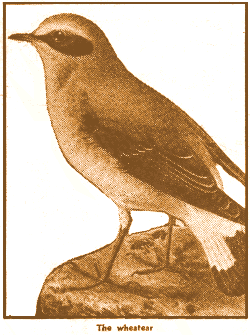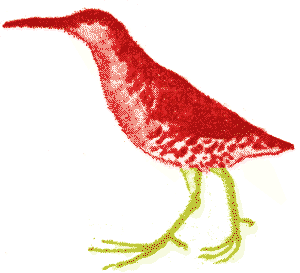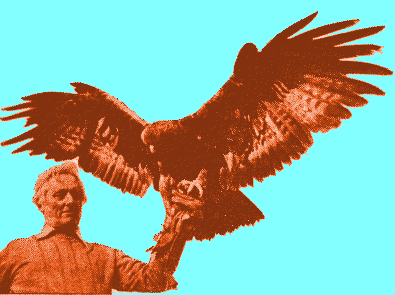THE EXODUS FROM AFRICA
by Bill Mulligan

WINGS over Africa. Wings hurrying eager travellers over desert, jungle, and
sea to fulfil an urgent mission no less than the propagation of their kind.
Yes, it won't be long now. In just a week or two, millions of migrants will
invade this country from Africa, flying by night and feeding end resting
by day, and when they get farther north,always keeping behind the isotherm
which activates the insect life essential for their survival.
This recurring miracle of the seasons is sparked off by many factors - perhaps
an inherited instinct to return to the territories from which they may have
been banished in the Ice Age, but more practically by the lure of the much
longer period of daylight offered in the Northern hemisphere for the feeding
of their young than is provided in the tropics.
No sooner are they here than the dramatic breeding cycle begins - the mating,
the nest building, the laying and incubation of the eggs, the feeding of
the young, and then in late summer, the return to their wintering quarters,
bringing to light the astounding fact that millions of birds hatched in this
country, will find their way unerringly over the long and perilous route
into deepest Africa which they have never travelled before.
First
What a story! No wonder scientists of the world have been trying for many
years to fathom how it is done and wether in fact they have some other sense,
some inbuilt mechanism which humans do not have.
So which of these amazing creatures do we welcome first? It's odds on the
wheatear (pictured above) that dapper little bird in grey fawn white and
black which flirts its tail so beguilingly, showing.the brilliant eye-catching
white of the rump and which has over the years with few exceptions made the
third week in March its arrival time.
That nondescript warbler, the chiffchaff bird whose song embraces only two
notes is not far behind and the swallow occasionally turns up before April
comes. On the hills the ring ousel, black and sooty grey, with a striking
white gorget, a member of the thrush family settles into its heathery habitat
by the end of March. Then in April the floodgates open.
Battle for Life
BILL MULLIGAN tells the sad tale of a water rail and is desperate adventures in a hostile environment.
 THIS is
the sad, sad story of a water rail - a irnall moorhen-like bird with dull
brown and grey plumage and a longish red bill, which, having endured many
buffetings by a malign fate,finally disappeared into a hostile environinent
far from its native haunt. The capacity of wild creatures to survive against
all the odds never ceases to amaze.
THIS is
the sad, sad story of a water rail - a irnall moorhen-like bird with dull
brown and grey plumage and a longish red bill, which, having endured many
buffetings by a malign fate,finally disappeared into a hostile environinent
far from its native haunt. The capacity of wild creatures to survive against
all the odds never ceases to amaze.
Having been flushed willy-nilly from its gulleys off Parkgate, on the Dee
estuary, by a recent massive spring tide, it fetched up under the promenade
wall, scrabbling desperately to climb it and reach safety, and then with
a convulsive leap cleared it and dropped under the very nose of a dog. The
dog set the bird, chased it, caught it and was holding it in its mouth when
the owner snatched it away.
The rail having been released apparently uninjured, promptly dived under
a car and stayed there. When this car left it scuttled under the next car
in line, and then the next, and the next unttil there was only one car left
- ours.
When our time came to go we carefully inspected the ground under the car.
No water rail. The end of the story? Not by a long chalk. Two and a half
day later my friend phoned to say he and just opened the bonnet of his car
after his usual run to town, and found the water rail. It promptly dived
under the engine and out of sight. My friend tried to catch it, but, not
surprisingly, failed. Did it make its way through the brick and concrete
jungle of Salford to the nearby Irwell, there to find sanctuary in the reed
or marshy ground? Or did it end its chequered career under the wheels of
a bus? I don't think I want to know the answer.
A Summers' Eagle
 A
Summers' Eagle is the story of a man and a bird. Gerald Summers, author
of The Lure of the Falcon, Where Vultures Fly, and Owned by an
Eagle, talked to us about his 16 years with Random When you share your
life with a dog, or a cat,you are generally more or less in control. But
when you are 'owned by an eagle '- particularly a female Golden Eagle the
eagle is emphatically the dominant partner and seldom lets you forget it.
However tame and affectionate Random may be, one can't help feeling
a slight sense of inferiority. She is big,beautiful and powerful; with a
strong, if offbeat sense of humour. She's also fanatically possessive - both
of me and of her territory of several square miles. She's critical of the
friends I choose, her IQ is high and her memory is phenomenal. Since an eagle's
lifespan is anything up to 50 years (Random is just 17), she may he inherited
by my grandchildren. I can only hope that they hit it off together!
A
Summers' Eagle is the story of a man and a bird. Gerald Summers, author
of The Lure of the Falcon, Where Vultures Fly, and Owned by an
Eagle, talked to us about his 16 years with Random When you share your
life with a dog, or a cat,you are generally more or less in control. But
when you are 'owned by an eagle '- particularly a female Golden Eagle the
eagle is emphatically the dominant partner and seldom lets you forget it.
However tame and affectionate Random may be, one can't help feeling
a slight sense of inferiority. She is big,beautiful and powerful; with a
strong, if offbeat sense of humour. She's also fanatically possessive - both
of me and of her territory of several square miles. She's critical of the
friends I choose, her IQ is high and her memory is phenomenal. Since an eagle's
lifespan is anything up to 50 years (Random is just 17), she may he inherited
by my grandchildren. I can only hope that they hit it off together!
A Summers' Eagle 'Random is a golden eagle and she has been my
constant companion by day,and not infrequently by night,for close on 16
years'
Jeanine McMullen talks to Gerald Summers about this extraordinary
bird which brought him and his wife Imogen together.